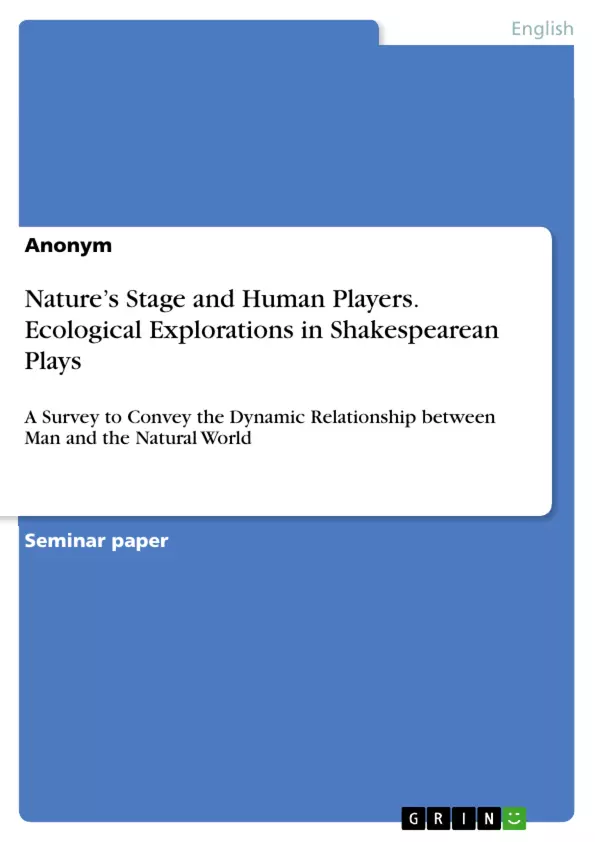In the following paper, the relationship between man and nature will be analyzed and explained based on three literary works by Shakespeare: "The Tempest", "A Midsummer Night's Dream" and "MacBeth".
Climate crises and environmental catastrophes have been terms that have preoccupied politicians, scientists and people in general for several years now. Accordingly, people often ask themselves to what extent the environment will change life in the future. In order to be able to solve this problem at all, man must first reflect and rethink the relationship with the environment since the relationship with the environment is ultimately to be seen as a consequence for the environmental problems that are current today. Due to the complexity of the concept of nature and the ambiguous definition of the term, different
constellations exist according the relationship between humans and nature...
Inhaltsverzeichnis (Table of Contents)
- Introduction
- Main Part
- Shakespeare and Presentation of Nature
- Man-Nature-Relationship
- Metaphorical Use of Nature and Ecological Symbolism
- Contemporary Relevance and Eco-Criticism
Zielsetzung und Themenschwerpunkte (Objectives and Key Themes)
This work analyzes the portrayal of nature in three of Shakespeare's plays: Macbeth, A Midsummer Night's Dream, and The Tempest. It examines Shakespeare's presentation of the man-nature relationship within the context of his time and explores the contemporary relevance of his ecological symbolism. The analysis aims to understand how Shakespeare's works reflect broader philosophical shifts regarding humanity's place in the natural world.
- Shakespeare's depiction of nature in his plays.
- The man-nature relationship as presented by Shakespeare.
- The use of natural imagery and symbolism in Shakespeare's works.
- The ecological implications of Shakespeare's portrayal of nature.
- Connecting Shakespeare's perspectives on nature with contemporary eco-criticism.
Zusammenfassung der Kapitel (Chapter Summaries)
Introduction: This chapter establishes the context of the study by highlighting the growing concern over environmental issues and the need to re-evaluate humanity's relationship with nature. It introduces the concept of anthropocentrism and its limitations in understanding ecological problems, and briefly discusses the importance of non-anthropocentrism.
Main Part - Shakespeare and Presentation of Nature: This section delves into Shakespeare's portrayal of nature, arguing that his works reflect a complex and evolving understanding of humanity's place in the natural world. It discusses the interconnectedness of all things and the uncertainties this presented in the 16th century. The chapter highlights how characters who embrace harmony with nature find redemption.
Main Part - Macbeth: This section focuses on Macbeth, illustrating how Shakespeare uses natural imagery, particularly weather patterns, to reflect the actions and consequences of the characters' choices. The untouched wilderness is presented as symbolic of Macbeth's downfall. The chapter explores how nature can be interpreted as both reactive to human actions and symbolic of larger forces at play.
Main Part - The Tempest: This section examines The Tempest and analyzes the role of nature as a tool of revenge and ultimately, forgiveness. Prospero's manipulation of the storm is discussed to illuminate the themes of power and control in the human-nature relationship.
Schlüsselwörter (Keywords)
Shakespeare, nature, man-nature relationship, ecological symbolism, anthropocentrism, eco-criticism, Macbeth, The Tempest, environmental issues, literary analysis.
- Quote paper
- Anonym (Author), 2023, Nature’s Stage and Human Players. Ecological Explorations in Shakespearean Plays, Munich, GRIN Verlag, https://www.hausarbeiten.de/document/1511795


